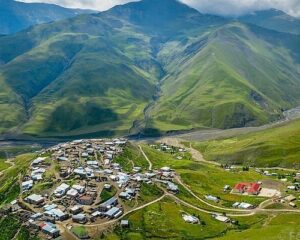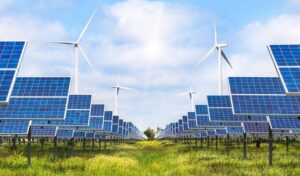
By Dr. Mehmood Ul Hassan Khan
Most recently, President Ilham Aliyev has signed a decree declaring 2024 as the ‘ Green World Solidarity Year’and reaffirming Azerbaijan’s commitments to global climate change efforts.
The document aims to set a framework for the 2024 UN Climate Change Conference (COP29), which will take place in Azerbaijan next year.
Frankly speaking holding of COP29 in Azerbaijan reflects the international community’s profound respect and trust in Azerbaijan, recognizing the nation’s endeavors in environmental protection and addressing climate change on national, regional, and global scales.
Green energy has great prospects in Azerbaijan. It has already announced to export 30 percent of its electricity from renewable sources and to export 4 GW of energy to Europe through the cables passing the Black Sea by 2030 which has great trans-regional socio-economic, geopolitical and geostrategic multiplier effects.
During 2022 the Republic of Azerbaijan, Georgia, Romania, and Hungary signed the “Agreement on a strategic partnership in the field of green energy development and transmission.
It also intends to transfer the electricity produced in Central Asia through its territories in the future. Most recently, it signed a joint declaration with Kazakhstan and Uzbekistan to export electricity generated from renewable sources to European countries.
The rapidly changing geopolitical and geostrategic conditions of South Caucasus, Central Asia, Black Sea and of course Caspian Sea and increasing energy demand in Europe have many matching boxes however, many regional stakeholders of oil & gas and even global movers & shakers will try to derail this mega project. In this regard, I suggest that policy makers of Azerbaijan should include China and its trans-regional mega project of BRI to complete it in the future.
Green energy holds the secret of human survival in future because of increasing incidents of climate disasters around the globe. The states, societies and systems are in the line of fire because of looming threat of climate change in the world.
In this regard, green energy including solar, wind, hydropower, biofuels and others, have become effective to accelerate the transition to less carbon-intensive and more sustainable energy systems in the world. It generation capacity has increased rapidly in recent years, driven by policy support and sharp cost reductions for solar photovoltaics and wind power in particular.
It is obvious that the deployment of renewables in the power, heat and transport sectors is one of the main enablers of keeping the rise in average global temperatures below 1.5°C. In the Net Zero Emissions by 2050 scenario, renewables facilitates electricity generation to be almost completely decarbonised.
Green energy comprises of wind, solar, hydrogen power generation which should be mantra of every government to reduce carbon footnotes and inching towards the desired goals of decarbonization and carbon neutrality in the future.
Many published reports show that Azerbaijan may be directly affected by decarbonization on a global scale. Resultantly, Azerbaijan may face both water scarcity and extreme hot weather in the coming years. It will especially affect agriculture.
According to the report of the UN Intergovernmental Panel on Climate Change (IPCC) the average annual temperature in the territory of Azerbaijan has increased by 0.4-1.3 degrees in the last 100 years. Azerbaijan will be among the nations with the most severe water shortages by 2040, and water supply will drop by 23 percent.
Unfortunately, its biggest river Kura is becoming drier and as a drought Kura, has not been able to reach the Caspian Sea for two years which vividly reflects the negative effects of carbon dioxide gases in the country.
On its part being a responsible member of the international community, Azerbaijan only contributes 0.11 percent to global greenhouse gas emissions; however, it started to actively participate in numerous decarbonization initiatives to address the climate change.
The adoption of the law on “Efficient use of energy resources and energy efficiency”, “National Action Plan on Energy Efficiency” and “Roadmap to accelerate the adoption of eco-design and labeling requirements for energy-using products”.
In addition, the “Azerbaijan 2030: National Priorities for Socio-Economic Development” program was announced in February 2021. The fifth priority mentioned in the program envisages the transition to a “green development” by contributing to a clean environment.
In May 2021, the law “On the use of renewable energy sources in the production of electricity” was adopted to expand the action plan in the speedy transition to clean energy.
It also plans to export 5 GW of electricity to Europe by 2030. A total of 4 GW will be exported under the Black Sea, and one GW will be exported from Nakhchivan through Turkiye for which integrated projects have already been initiated which would be game changer in terms of reduction of ratios/incidents of climate change, generation of more revenue from the exports of renewables to Europe and ultimately role of Azerbaijan in the renewable supply chain would be further enhanced in the days to come providing it a more forceful socio-economic, geopolitical and geostrategic role to secure its own vested interests.
Energy and precisely green energy/renewables have become the hottest source of investments and generation of revenues for the states in the world. It has become a beneficial business. It has also attached with numerous geopolitical and geostrategic dividends. Azerbaijan’s plan to export electricity produced from renewables would further enhance economic stability and sustainability of it. It will also further enhance its national drive of economic and energy diversification fetching lots of socio-economic and geopolitical dividends in the future.
It is predicted that it will also increase the role of Azerbaijan from being Middle Corridor to mainstream connecting hub of trans-regional energy/renewables.
It blesses with huge renewable energy resources. It is estimated at 135 gigawatts on land and 157 gigawatts at sea. The economic potential of green energy sources stands at 27 gigawatts, which includes 3 gigawatts of wind energy, 23 gigawatts of solar energy, 380 megawatts of bioenergy potential, and 520 megawatts of mountain river potential.
Azerbaijan has committed to reducing its greenhouse gas emissions by 30 percent from 1990 levels by 2030 and by 40 percent by 2050, as part of the Paris Climate Agreement.
To achieve this strategic goal it has formed the Renewable Energy Agency which ensures active participation of the private sector in the country. Ultimately it has increased the share of installed electricity generation from renewable energy sources.
It calls for the construction of the hydroelectric plants “Khudafarin” and “GizGalasi.” The completion of the 80 MW “GızGalasi” and 200 MW “Khudafarin” hydropower plants is expected to be within the next two to three years.
In October of this year, a 230-megawatt solar power plant built in Baku’s Garadagh district with the investment from Masdar, a leading operator of large-scale renewable energy projects in the United Arab Emirates, was inaugurated. The $200-million station will produce 1.5 billion kilowatt hours of energy per year and will reduce carbon emissions by 200,000 tons.
Moreover, acceleration of green energy space, energy efficiency and the usage of electric vehicles will be prioritized concurrently. According to the State Customs Committee, the usage of the EVs is on the rise which has increased by 6.2 times as compare to 2022.
Under the flagship project of the EU4U Energy Azerbaijan has already amended its National Development Commission and included waste management, forestry, land use change, energy, industrial processes and product consumption, and agriculture which will definitely reduce ratios of climate change in the country.
For the generation of green energies, Azerbaijan has signed agreements with Saudi Arabian “ACWA Power” and UAE’s pertaining to the construction of 240 MW wind power plants and 230 MW solar power plants, respectively.
Furthermore, an Executive Agreement was signed with the BP firm regarding the assessment and execution of the 240 MW solar power plant construction project in the Zangilan/Jabrayil area.
Another green energy project will be implemented in Nakhchivan by Nobel Energy, a part of NEQSOL Holding.The electricity produced at the 400-megawatt power station will address the domestic energy need and will be supplied to the Turkish market.
Moreover, the Asian Development Bank is supporting the implementation of the project “Knowledge exchange and Technical Assistance Support for the Development of floating solar panels” concurrently. As part of this project, a 100 kW pilot floating solar system will be installed on Lake Boyukshor, a first for Azerbaijan.
It also signed with the Japanese firm TEPSCO which will prepare the “Green Energy Zone” Concept and Master Plan in the areas liberated from occupation. Globally, renewables are set to contribute 80 percent of new power generation capacity to 2030 under current policy settings, with solar alone accounting for more than half of this expansion
It is good omen that during COP28 the green energy concept of Azerbaijan was ranked first. It intends to ensure 30 percent of its electricity from renewable sources by 2030. Azerbaijan has 200 GW of electricity potential, and it aims to turn 25 GW of this potential into electricity in the coming years.
During 2021, President Ilham Aliyev, while visiting Agdam, declared that the entire Garabagh zone will be a “green energy” zone. In Garabagh and Eastern Zangazur, 170 megawatt hydroelectric power stations were put into use in 2021-2023. By the end of 2024, this number will reach 270 megawatts. In a few years, the total capacity of hydroelectric power stations in the liberated territories will be 500 megawatts.
Azerbaijan has vast resources of oil and natural gas. According to the June 2021 BP Statistical Review of World Energy, at the end of 2020 its oil reserves of 7 billion barrels (1 Mt) accounted for 0.4 percent of global reserves. Oil is produced both onshore and offshore in the Caspian Sea, with offshore production accounting for about one-quarter of the total.
Furthermore, Azerbaijan has also an estimated 2.5 trillion cubic metres of proven natural gas reserves. While Azerbaijan is not as prominent in global gas as it is in oil, gas extraction is expected to continue contributing significantly to the economy in upcoming decades.
Comparative study of many published reports suggests that its energy mix is heavily concentrated in fossil fuels, with oil and gas accounting for more than 98 percent of total supply.
It is good omen that Azerbaijan’s renewable energy potential promises multiple advantages for the country. Relying more on renewable energy would help Azerbaijan save natural gas for exports and for use in the petrochemical industry; reduce the country’s GHG emissions to meet its 2030 Paris Agreement commitment; and improve electricity security by diversifying generation.
In this regard, its planned energy market reforms, the government has drafted a renewable electricity law and aims for renewable energy to provide 30 percent of electricity generating capacity by 2030 almost twice the 2018 share of 16 percent.
The government of Azerbaijan recognizes that sustaining strong growth will require a greener model. It has prioritized an agenda that aims to pivot the country towards a more sustainable and resilient economy, enabling it to meet its international environmental commitments and its pledge to reduce GHG emissions set in its Nationally Determined Contributions (NDC) under the Paris Agreement. (The author is: Executive Director: The Center for South & International Studies (CSAIS) Islamabad Regional Expert: Azerbaijan, China, CPEC & BRI)


